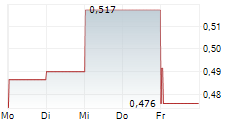
LUND, SWEDEN / ACCESSWIRE / August 27, 2024 / Cantargia (STO:CANTA) Cantargia (Cantargia AB; Nasdaq Stockholm:CANTA) today reported presentation of new preclinical data providing support for CAN10 as a potential treatment of fibrotic lung diseases. The new data shows upregulation of the CAN10 target protein IL1RAP in lungs from patients with systemic sclerosis associated interstitial lung disease (SSc-ILD) and idiopathic pulmonary fibrosis (IPF). IL1RAP is expressed on several cell types important for fibrotic lung disease and the number of IL1RAP positive cells were increased in fibrotic lungs compared to healthy. The data will be presented at the European Respiratory Society's annual congress September 7-11, 2024.
"The new data highlights the potential of CAN10 in fibrotic lung diseases. There is a large medical need to treat this group of diseases, and we see a huge future opportunity in this field" said Göran Forsberg, CEO of Cantargia.
SSc-ILD and IPF are irreversible fibrotic diseases with a very high unmet medical need. The new data from human lungs show that IL1RAP is expressed on several cell populations involved in lung fibrosis pathology, including epithelial cells, immune cells and fibroblasts, the cell population largely responsible for the pathological deposition of the extracellular matrix proteins that builds up the fibrosis. Moreover, the percentage of IL1RAP positive cells was higher in lungs from patients with SSc-ILD and IPF compared to healthy lungs. Together, these data strengthen CAN10 as a novel strategy to counteract pathological signaling in patients with lung fibrosis.
The data was generated in collaboration with the group of Prof. Gunilla-Westergren Thorsson at Lund University and will be presented by Dr. Linda Elowsson as a poster with an associated oral presentation. After the conference, the poster will be available at www.cantargia.com
CAN10 is one of two clinical projects in the Cantargia pipeline. The CAN10 antibody has been designed for treatment of several autoimmune/inflammatory diseases. The ongoing phase I clinical trial initially investigates increasing levels of CAN10 as single dose administration in healthy subjects followed by studies of multiple dosing in participants with psoriasis. The primary endpoint relates to safety. Details on the trial can be found at https://clinicaltrials.gov/study/NCT06143371.
For further information, please contact
Göran Forsberg, CEO
Telephone: +46 (0)46-275 62 60
E-mail: goran.forsberg@cantargia.com
About Cantargia
Cantargia AB (publ), reg. no. 556791-6019, is a biotechnology company that develops antibody-based treatments for life-threatening diseases and has established a platform based on the protein IL1RAP, involved in a number of cancer forms and inflammatory diseases. Cantargia's oncology program, the antibody nadunolimab (CAN04), is being studied clinically primarily in combination with chemotherapy with a focus on pancreatic cancer, non-small cell lung cancer and triple-negative breast cancer. Positive interim data for the combinations indicate stronger efficacy than would be expected from chemotherapy alone. Cantargia's second development program, the antibody CAN10, blocks signaling via IL1RAP in a different manner than nadunolimab and addresses treatment of serious autoimmune/inflammatory diseases, with initial focus on systemic sclerosis and myocarditis.
Cantargia is listed on Nasdaq Stockholm (ticker: CANTA). More information about Cantargia is available at www.cantargia.com.
About CAN10
The CAN10 antibody binds strongly to its target IL1RAP and has a unique capability to simultaneously inhibit signaling via IL-1, IL-33 and IL-36. Inhibition of these signals can be of significant value in the treatment of several inflammatory or autoimmune diseases. The initial focus of CAN10 will be on two severe diseases: myocarditis and systemic sclerosis. In preclinical in vivo models of myocarditis, a CAN10 surrogate antibody significantly reduced the development of inflammation and fibrosis, and significantly counteracted the deterioration of the cardiac function. The CAN10 surrogate also inhibited disease development in models of systemic sclerosis, psoriasis, psoriatic arthritis, atherosclerosis and peritonitis. A clinical phase 1 study, investigating CAN10 in healthy volunteers and psoriasis patients, is ongoing. Up to 80 subjects may be included in the trial. Good safety is shown at the completed dose levels, and additional data from the trial are expected continuously during 2024.
Attachments
Cantargia reports presentation of new preclinical data supporting CAN10 in fibrotic lung diseases
SOURCE: Cantargia
View the original press release on accesswire.com



